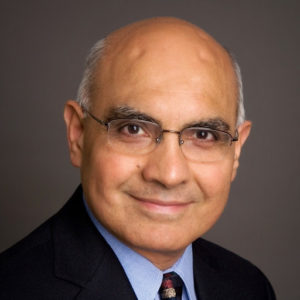Why Business Leaders Need Imagination

Forget your assumptions. Forget what you know, or think you know, about the world of today and where we may be headed.
To prepare for the future, one sure to be marked by increasing uncertainty and upheaval, leaders in business need to slip from the bounds of their current day-to-day thinking. “We are biased significantly by the world we know today,” says Anirudh Dhebar, professor of marketing at Babson.
According to Dhebar, business leaders need to indulge in what science fiction writers, as well as children, employ on a regular basis: their imagination. Logical, linear thinking about what the future may look like isn’t necessarily effective. “Sometimes, you have to let the logic go,” says Dhebar, also the Susan and Gary DiCamillo Term Chair in Teaching Excellence. “What we need is a leap of faith, a leap of logic. We need fantasy.”
Tapping into imagination isn’t always easy. “The older we get as humans, and as institutions, we become less and less able to indulge in imagination and fantasy,” Dhebar says.
To be ready for what the future may bring, though, those in business must regularly be planning and imagining. They can’t overtly focus on today without also pondering the possibilities of tomorrow. “You have to make today’s trains run on time, but if that’s all we do, tomorrow we might become irrelevant,” Dhebar says.
The Larger Forces at Work
In his forward-thinking research and teaching, Dhebar is interested in disruption and transformation. “My interests are at the nexus of science, technology, and business and society, and how the dynamics of these play out over time,” he says.

Anirudh Dhebar, professor of marketing at Babson and the Susan and Gary DiCamillo Term Chair in Teaching Excellence
In his intensive graduate course, Disruptive Change and Enterprise Transformation, Dhebar has students explore the “driving trends, disruptive forces, and unhinging uncertainties” that may lead to a future vastly different than our present. Specifically, students explore how large sectors such as education, energy, and health care can prepare themselves for tomorrow’s tumult.
“How do I best prepare myself and my enterprise to thrive in tomorrow’s world? Not just to survive, but to thrive?” Dhebar says. “It is a central question all of us should be asking every day.”
Dhebar says that answering this question is a lot like studying geology. In geology, we can observe what is happening on the surface, say erosion, but we can’t forget about the larger forces occurring underneath, such as the plate tectonics shaping mountains and continents, that are slowly but inevitably altering our world.
In that sense, trends such as the aging population and the backlash against globalization are pressing issues that are playing out conspicuously in the world today, but we can’t lose sight of the larger forces at work, including climate change, artificial intelligence, and genetic science, whose impacts may be harder to visualize, at least at first.
“These are the dynamics that shape the world of tomorrow,” Dhebar says. “Businesses are facing huge tectonics.”
All Possible Scenarios
So how can businesses prepare for the changes that are coming? Every few years, leaders need to step away from the operations of their business and deliberately make time to contemplate the future. That first involves taking an honest and wide-angle look at the world today and the complex forces and connections that shape it. “We need to make sense of today’s world in a much more discerning way, with a wider field of vision,” Dhebar says.
Then, leaders’ imaginations need to take a role as they look to the future and imagine the various scenarios that may occur over the ensuing decades. Sometimes, leaders may envision threats to an industry coming from unexpected places. A luggage maker, for instance, could consider the repercussions of Zoom, Skype, and other video platforms. As people meet over video, will that mean that they will travel less?
“How do I best prepare myself and my enterprise to thrive in tomorrow’s world? It is a central question all of us should be asking every day.”
Professor Anirudh Dhebar
An auto maker may consider the effect of electric vehicles or self-driving cars on the industry, but going beyond that, what can they make of Uber and Lyft? If people can easily order a ride, why would they even need to buy a car? Or, if video platforms discourage people from traveling, might they also discourage people from car ownership?
The goal is to envision all possible scenarios and not be caught flat-footed by the future. Businesses can create contingency plans for potential situations that might be years or decades away.
“It’s about expanding your mind to the range of possibilities. This is the value of scenario thinking,” Dhebar says. “If I wait for the scenarios to play out, it’s too late.”
Posted in Insights




